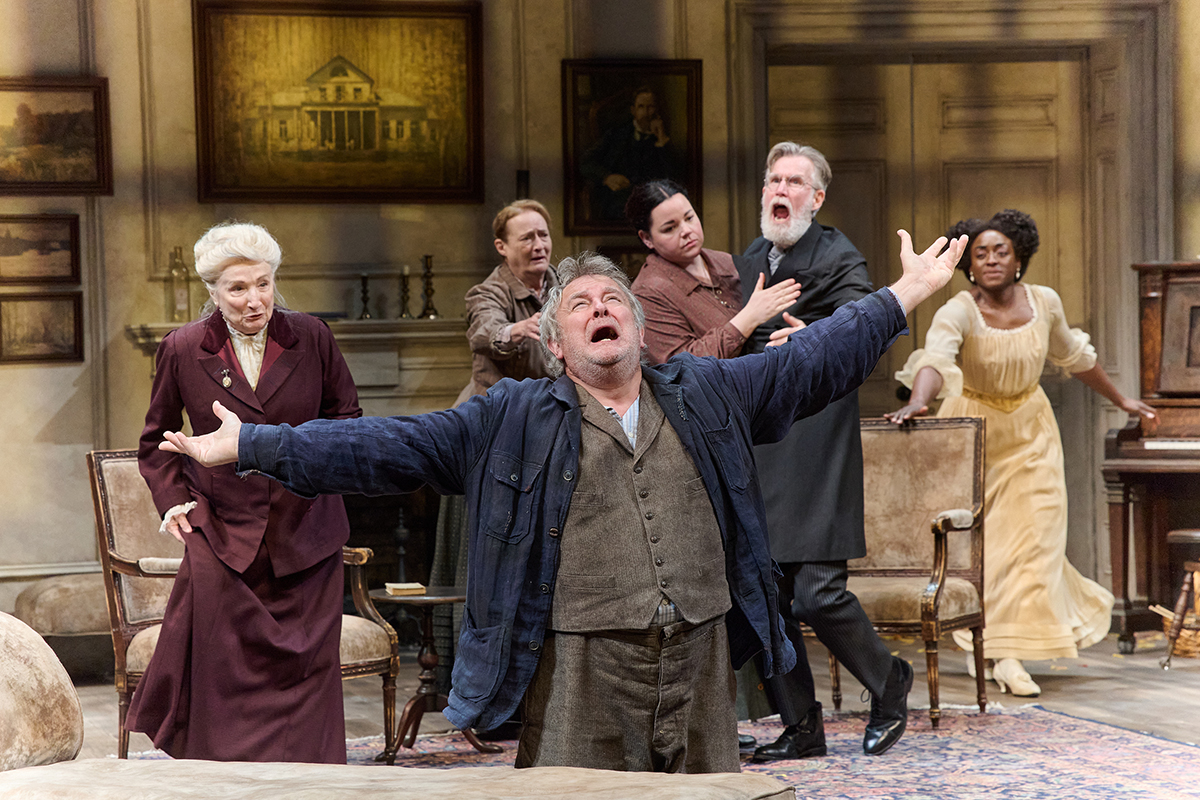‘Jane Anger’ Review: Anger Mismanagement
Despite two uproarious turns from Michael Urie and Ryan Spahn, Talene Monahon's Jane Anger misses its feminist mark.

Despite all its humor and good intentions, Talene Monahon’s feminist revenge-comedy Jane Anger (★★★☆☆) has a serious stone in its shoe: it does an annoyingly good job of feeding the myth that women can’t be as funny as men. The genuinely frustrating thing here is that Monahon obviously is funny, but — irony of ironies — only when it comes to writing her two male characters, a fictional Shakespeare and his manservant Francis.
While they get all the best gags and comic potential, the titular Jane, Monahon’s plot-driving proto-feminist, gets the heavier-handed fare by a long mile. Shakespeare’s long-suffering wife Anne Hathaway comes off even worse, being written as a woman infantilized — the kind of rabbity airhead seen in low-rent sitcoms since the beginning of time.
If Monahon’s point is that misogynistic repression creates this kind of uncentered woman, the point is so glancingly made, it calls into question Monahon’s goals. Is she really trying to say something here or is this more about her ability to be as goofy as possible, damn the consequences?
Indeed, Monohan’s primary use of Jane as a vehicle to bring out various touchstones of sexism and misogyny in Shakespeare’s age — and, of course, ours — feels similarly superficial. As honorable as it is, it feels grafted onto something that wants to be wholly more anarchic and a damn sight funnier. The plot’s descent into complete Monty-Pythonesque chaos only confirms this incongruity and leaves the beginning and end of the play, served up as teachable moments, as a pair of buzz-killing bookends.
Of course, no one would argue that there isn’t value in imagining the inner lives of the wives and mistresses of the (usually white) men of past eras, but trying to bring humor to the exercise really needs a cohesive vision — one that breaks some genuine molds.
Bringing this even more to the fore are casting choices that work like a self-fulfilling prophecy. As Shakespeare, imagined here as a self-centered twerp of the highest order, Michael Urie is just about as funny, clever, and all-around entertaining as he can possibly get given the material and the play’s unevenness. His comic timing is perfect, be it a one-liner or high physical comedy, and he cuts a distinctly dashing historical figure.
[infolink1]
As his raggedy manservant Francis, Ryan Spahn largely delivers on the loud and silly required of this buffo role and pulls off a daringly anachronistic breaking of the fourth wall with joyous aplomb. Put simply, this duo runs with the best of Monahon’s comedy, and they are seriously good fun to watch. If the play had been built solely around their hijinks, it would have been the treat we didn’t get to see.

But then it comes to the women. Although Amelia Workman is phenomenally charismatic, her Jane belongs to a different, more earnest play, the kind where the humor is tempered by a wider purpose. Sure, Jane should be angry as she leads us through Shakespeare’s cavalcade of causal misogyny, but Workman’s edge, subtle though it is, feels incongruous in a comedy that indulges so heavily in the madcap, while skimming the more substantial.
[infolink1]
In yet another irony, Monahon herself plays the histrionic Hathaway, channeling unbounded enthusiasm for the role, delivering it with the necessary pitch, if not always enough enunciation. Watching her flounce around like a spoiled child may add energy, but it’s tempered by a confusion of purpose: we’re obviously meant to laugh at her, but why make a stereotypical clown out of a woman in a play that is aiming to be angry that women aren’t taken seriously?
So, we are left with two very funny men and two less funny women and Monahon’s overarching premise: what if Shakespeare’s career was actually cut short by the revenge of a righteous feminist? Despite all the pointed asides and climactic hullabaloo, Monahon never gives us more than fanciful conjecture on mistresses as muses, sonnets taken out of context, and Jane’s final (and overly-drawn out) satisfaction in figuring out how to get her anti-misogynist essay published.
Even choosing Shakespeare as her target feels off the mark: why a literary phenomenon who has written some of the most beautiful language on love, loss, and impending mortality? Maybe this would all work in some version of a “girl-power” universe, but since it barely moves the needle in this one, keeping Shakespeare alive and writing seems like a better bet.
Jane Anger runs through Jan. 8 at The Shakespeare Theatre’s Klein Theatre, 450 7th St. NW.
Tickets are $35 to $125. Call 202-547-1122 or visit www.shakespearetheatre.org.
Support Metro Weekly’s Journalism
These are challenging times for news organizations. And yet it’s crucial we stay active and provide vital resources and information to both our local readers and the world. So won’t you please take a moment and consider supporting Metro Weekly with a membership? For as little as $5 a month, you can help ensure Metro Weekly magazine and MetroWeekly.com remain free, viable resources as we provide the best, most diverse, culturally-resonant LGBTQ coverage in both the D.C. region and around the world. Memberships come with exclusive perks and discounts, your own personal digital delivery of each week’s magazine (and an archive), access to our Member's Lounge when it launches this fall, and exclusive members-only items like Metro Weekly Membership Mugs and Tote Bags! Check out all our membership levels here and please join us today!

























You must be logged in to post a comment.